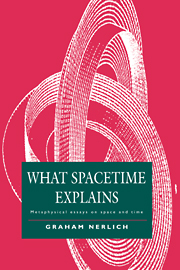Book contents
- Frontmatter
- Contents
- Preface
- Introduction
- Part One Ontology and methodology in relativity
- Part Two Variable curvature and General Relativity
- 6 How Euclidean geometry has misled metaphysics
- 7 What can geometry explain?
- 8 Is Curvature intrinsic to physical space?
- 9 Holes in the hole argument
- Part Three Time and causation
- Bibliography
- Index
9 - Holes in the hole argument
Published online by Cambridge University Press: 19 October 2009
- Frontmatter
- Contents
- Preface
- Introduction
- Part One Ontology and methodology in relativity
- Part Two Variable curvature and General Relativity
- 6 How Euclidean geometry has misled metaphysics
- 7 What can geometry explain?
- 8 Is Curvature intrinsic to physical space?
- 9 Holes in the hole argument
- Part Three Time and causation
- Bibliography
- Index
Summary
Introduction
John Earman and John Norton claim that modern spacetime realists (substantivalists) face a new problem: a realist can't also be a determinist. They argue this both separately (Earman 1989; Norton 1987) and together, notably, in Earman and Norton (1987). The problem has been tackled here and there, mainly in attempts to find a picture of determinism which evades the problem. (Butterfield 1987; 1989; Maudlin 1990a).
This has my sympathy, but I look for another kind of reply. I explore the analogy (which Earman and Norton draw) with Leibniz's classic objection to Newton's absolute space. There are at least two ways of understanding both the analogy and the hole argument. One way, which I'll call the metaphysical way, stays fairly close to the historical Leibniz. Its theme is whether realism or relationism in regard to space (spacetime) is ontologically proper (legitimate, necessary etc.). Another way, a more modern one which I'll call the extensional way, simply sees the issue as a cost–benefit calculation in theory choice, pricing, as it were, one set of metaphysically innocent theoretical entities against another. I argue that, whichever way we interpret the argument, we find no strong reason to abandon realism. Understood in the metaphysical way, Leibniz Equivalence simply fails to establish what is claimed for it. Understood in the extensional way, the indeterminism claimed by the hole argument is something a realist cannot reasonably care about. In any event, the indeterminism is chosen within a realist framework for plain, straightforward reasons of physics.
- Type
- Chapter
- Information
- What Spacetime ExplainsMetaphysical Essays on Space and Time, pp. 206 - 224Publisher: Cambridge University PressPrint publication year: 1994
- 1
- Cited by

